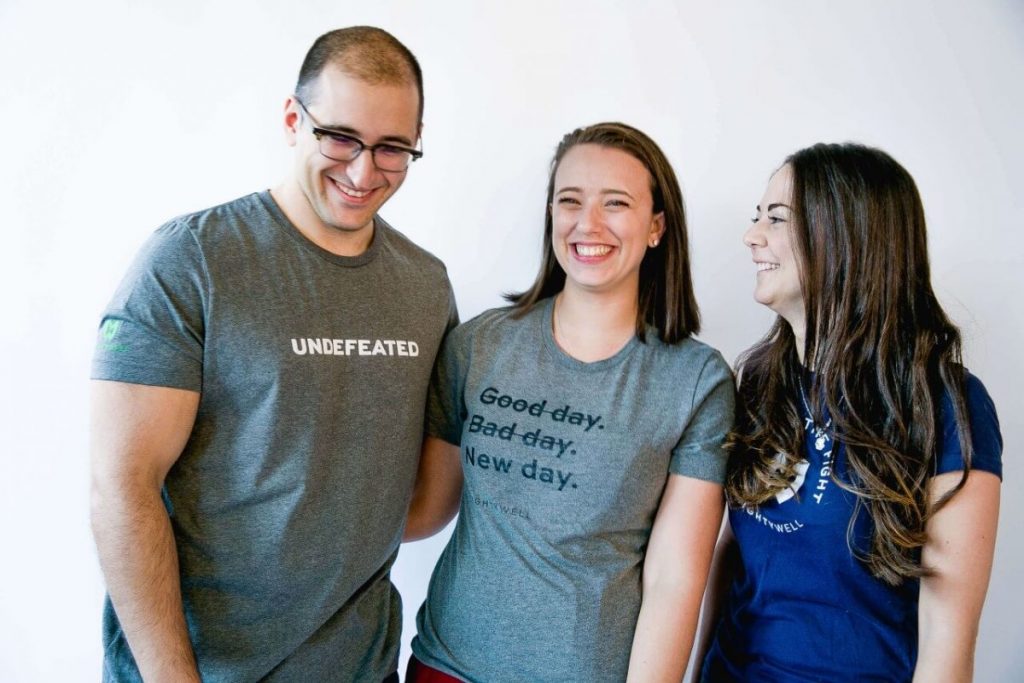
Emily Levy understands her customers better than most.
She’s the co-founder of Mighty Well, a clothing and accessories line for those living with disabilities or chronic illness that she launched with her best friend, Maria del Mar Gomez, and now-husband, Yousef al-Humaidhi. And as a person with Lyme disease, Levy is both an entrepreneur and a member of her business’ target demographic.
She was 19 years old and finishing her first year at Babson College when she was diagnosed in 2013 — at that point, she learned, the disease had spread to her brain, and caused inflammation throughout her entire body. Levy’s medical team recommended a PICC line, a long thin tube that delivers medicine straight into a vein.
After the PICC line was inserted, Levy hated the unwanted attention it drew, and was shocked when doctors recommended a cut-off sock as a makeshift covering. She took it upon herself to design a sleeker, safer alternative — first as a solution for her everyday life, then as a class project, and then as a product intended for sale. Three years after her diagnosis, Mighty Well was officially launched, and her creation was its first offering.
As the 5-year anniversary of her business approaches, she’s been reflecting on what keeps her going. And for the most part, it’s her customers who motivate her — especially as we all continue to navigate a pandemic that disproportionately affects Levy and her clients.
“We’ve had quite a few customers and brand ambassadors who passed away this past year and a half. We’re working with such a vulnerable population,” she says. “This tragic experience gave me a renewed sense of the necessity of Mighty Well to the entire chronically ill and disabled community. “
As Levy notes, there aren’t many CEOs “who can say ‘I know what it’s like to feel the physical pain that my customers are feeling.’”
Finding Ways Forward
Levy had always been wired for entrepreneurship. “My family owns one of the first surf shops on the East Coast,” she boasts, adding that this gave her both the drive to start up, and a familiarity with high-performance fabric that she didn’t initially know she’d need.
Fast forward to her time at Babson, when she began to turn her improvised textile solution to her own PICC line into a flagship product for a business. The idea was brewing in Levy’s mind during the rise of Instagram as a social media platform. She decided to use this to her advantage, cruising relevant hashtags to see “what other young, disabled women were doing to not only bring more dignity to life, but functionality” such as carrying groceries or playing with children.
A combination of Instagram insights and in-person conversations helped her develop the PICCPerfect line covers and a host of other products designed specifically for people with disabilities and chronic illnesses — think pill organizers, masks and medical backpacks. She partners with manufacturing companies both in the U.S. and abroad to bring each idea to fruition.
Levy wouldn’t disclose specific revenue figures, other than 156-percent growth in the trailing 12 months, but did say the Mighty Well team is actively seeking investors. The startup has raised $735,000 in seed funding, according to Crunchbase. Getting VCs on board isn’t easy. “What we’ve seen is, for people who have been affected [by illness] in some way in their life — personally, or in their friends or family circles — Mighty Well is a no-brainer to invest in,” Levy says. “But when we meet with average investors, they’re just looking at dollars and cents. They’re not looking at social impact.”
Lifting Each Other Up
In the meantime, Levy gets a big boost from seeing the roles Mighty Well plays in customers’ lives already, largely through the Instagram posts the company is tagged in — the patient wearing a Mighty Well mask while ringing the bell that signifies the completion of chemotherapy, or the young woman wearing a PICCPerfect with her prom dress. “We are a very small part of [their] healing journey,” Levy says. “That brings tears to my eyes.”
Securing FDA approval and insurance reimbursement codes for some of her products, two relatively recent developments, also opens new doors, she adds. “I’m really excited that a device I created for my own health and safety is now being brought into some of the top healthcare facilities in the country,” Levy says. “It’s the biggest validator that what we’re doing is needed in the market.”
And she couldn’t have done it, she adds, without her team — specifically her co-founders, and their two full-time and seven part-time employees.
“As a disabled founder, I know how important it is having co-founders and team members around you who can help support you in times when you need to step away for medical treatments,” she says.
In earlier times of her disease, del Mar Gomez was her rock, who “helped me shower with my first PICC line, helped me get food from the dining hall on days when my body could not make it down the hallway, helped take notes for me in class when my brain fog was out of control.”
It was invaluable, treasured assistance for Levy — as well as an ever-present reminder of the sort of support Mighty Well’s customers continue to need. “There are so many nuances of living with a disability that don’t even cross the average person’s mind,” she says. “That has allowed us to infuse those challenges into the brand we’re creating.”




